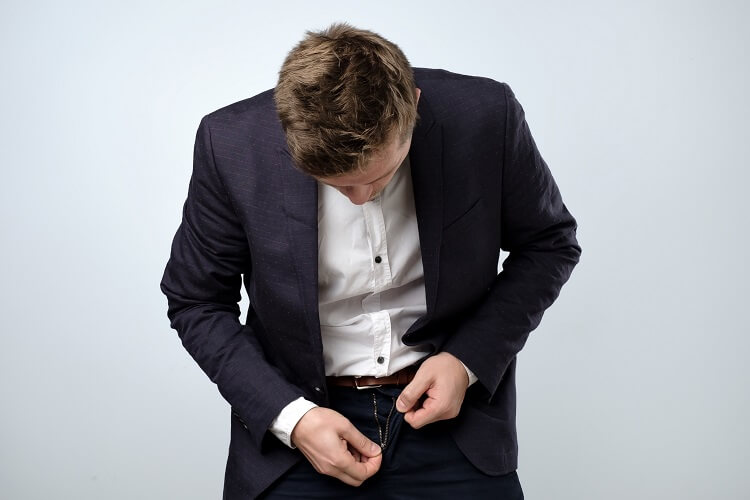Erectile dysfunction (ED) is a condition that prevents a man from getting an erection or staying hard. ED can lead to a number of problems – it can affect relationships, hurt a man’s self-esteem, and lead to problems conceiving a child.
Erectile dysfunction is a very common condition among men of all ages. However, just because you have a hard time getting an erection once in a while doesn’t necessarily mean that you have erectile dysfunction.
Many men struggle to get hard two or three times and then rush to the doctor to get a prescription or a diagnosis for ED. However, that’s not always necessary.
In this article, we’re going to talk about the other symptoms of ED, provide some tips on how you can help with the diagnosis of ED with your partner, and give you some tips and tricks on how to treat erectile dysfunction.
Table of Contents:
- Not all erection issues are signs of erectile dysfunction
- Symptoms of erectile dysfunction
- How to discover erectile dysfunction symptoms with your partner
- Medical advice tips
- Health complications related to erectile dysfunction
- What to do to prevent erectile dysfunction
- Ways to treat erectile dysfunction

Not all erection issues are signs of erectile dysfunction
If a man has a hard time getting an erection, it’s quick for them to jump to the assumption that they have ED. However, there are lots of things that can affect a man’s ability to get an erection, ranging from alcohol to unhealthy food.
Because of the many different issues that can lead to ED, you can’t really be certain that you have it unless it’s a recurring experience. There are also a number of other symptoms associated with ED that aren’t an inability to gain an erection.
Symptoms of erectile dysfunction
So, what are the symptoms of erectile dysfunction? They mostly relate to the penis itself, and all tend to prevent a man from finding sexual satisfaction.
If you are experiencing a few of these symptoms, and have been experiencing them with some regularity for an extended period, it may be time to go to the doctor and seek a diagnosis for ED.
Difficulty getting an erection
The first and most common symptom associated with this embarrassing condition is an inability to get an erection. Men with ED are often unable to get an erection at all, or if they are, they are unable to get one that’s hard enough to actually penetrate their partner.
Difficulty keeping an erection
Some men may struggle from a form of ED in which they have trouble sustaining an erection. They may not have a hard time getting an erection, but once they do, they have a very hard time keeping it up.
Softer erections
Some men with ED may be able to get somewhat hard. They may even be able to maintain this soft erection for an extended period. However, generally, these soft erections are not hard enough to penetrate the partner or to provide satisfaction.
Less girthy erections
Another thing that men with ED may notice is less girth in their erections. This is because less blood is able to flow into the penis. This means that the soft tissues composing your penis cannot grow larger, and as such, you will seem less girthy.
Reduced sensitivity
Another issue that men with ED may experience is reduced sensitivity. This lack of sensitivity often makes it hard for them to ejaculate, if they are able to get hard at all. If they are unable to get hard, the reduced sensation will make it much harder for them to actually get an erection even if they’re being stimulated.
Reduced sexual desire
Another symptom of ED can be reduced sexual desire, although more often than not this is the result of another problem. Reduced sexual desire tends to contribute to ED, not the other way around. One of the reasons that ED is such a difficult problem for men is because it prevents them from fulfilling their sexual desires.

How to discover erectile dysfunction symptoms with your partner
It can be a good idea to ask your partner, if you have one, to help you identify symptoms of erectile dysfunction. One of the reasons for this is because your partner is more aware – or at least aware of different aspects – of your penis. This means that they’ll be able to provide you with some information you might not be aware of yourself.
First off, your partner can simply tell you whether or not they are satisfied after you lose your erection. If they aren’t, ask them why.
If your erection has become softer, for example, you might not be aware of this. However, your partner might be. They will also be able to tell you if you’ve lost some girth or if there has been a change in the angle of your penis.
Getting your partner to tell you everything that they’re experiencing is a good way for you to determine whether or not you have ED.
Medical advice tips
If you are struggling with ED and have confirmed it, it can be useful to go see a doctor to get a formal diagnosis.
It’s also a good idea to see a doctor if you are struggling with other symptoms along with ED. Erectile dysfunction can actually be a sign of another health complication. If this is the case, you would require additional medical care.
Health complications related to erectile dysfunction
There are a number of health conditions, complications, and behaviours that can put someone at risk for developing ED. These are some of the most common risk factors:
- Diabetes, which can lead to high blood pressure and make it harder to get an erection
- Atherosclerosis, a hardening of the arteries that prevents blood flow
- Stress and anxiety can lead to high blood pressure, making it hard to get an erection. Some forms of ED are also purely psychological in nature and can be treated by seeing a therapist
- Drinking and smoking can both lead to changes in blood pressure and hormones, making it hard to achieve an erection
- Prescription medications can also interfere with blood pressure, libido, and sexual health
- Injuries to the brain and spine
- Hormonal conditions, such as hypogonadism – a condition in which someone can’t produce enough testosterone
- Radiation therapy
- Parkinson’s disease
- Strokes
Any of these conditions can lead to ED. If you are having a hard time maintaining an erection and are also noticing other, seemingly unrelated symptoms, it could be a good idea to go see a doctor.
What to do to prevent erectile dysfunction
The best way to treat ED is to avoid getting it in the first place. That means taking preventative measures to ensure that you don’t get ED.
However, the following preventatives can also work as natural, lifestyle-related treatments for ED. Before going to the doctor and seeking medication, make sure that you’re doing all of the following things. If you’re not, then this could be the cause of your ED.
- Avoid smoking and drinking. Smoking – especially over the long term – can lead to chronic high blood pressure and make it very difficult for a man to get an erection.Repeated drinking can do this, as well.Occasional drinking (once or twice a week) may not lead to permanent ED, however, most male drinkers are aware of the effects of “whiskey dick,” a temporary, alcohol-induced form of ED. Whiskey dick does not usually last much longer than the alcohol itself.
- Eat healthy. Our body relies on a large number of vitamins, minerals, fats, and other nutrients to keep in good shape. Most of these nutrients come from the food that we eat. Make sure to eat a diet rich in vegetables, whole grains, legumes, and fruits. Make sure to stay hydrated, as well – being hydrated ensures that these nutrients are easier absorbed.
- Watch your weight. Being overweight can lead to conditions like diabetes, and can cause high blood pressure. Both of these things can make someone more prone to ED.
- Stay active. Exercise is what primes your cardiovascular system: your heart, your veins, and your arteries. This system is responsible for pumping blood throughout your body – including your penis.If you never exercise and don’t have a strong cardiovascular system, then your heart will simply not be able to reliably pump blood down to your penis. As you can imagine, this would make it pretty difficult to get an erection.
Ways to treat erectile dysfunction
Fortunately, there are lots of ways that you can treat the problem. If you are just noticing the warning signs of erectile dysfunction, try some of the simpler, all-natural methods first.

Improve Your Lifestyle
As mentioned above, having a healthy lifestyle is important for making sure that you don’t get ED. Make sure that you eat healthy, stay hydrated, get enough sleep, and exercise on a regular basis. If you are doing all these things and are still struggling to get an erection, it could be time to try another method.
Use Herbal Supplements
There are plenty of herbal supplements that have been used for helping to treat erectile dysfunction. Some of the most common are:
- Ginseng, an herb used since ancient times to help improve sexual health and vitality of both males and females
- Horny goat weed, an aptly-named herb that helps boost libido and blood flow to the penis
- Maca root, a superfood herb that grows in Peru and has incredibly potent libido-boosting effects
If you are looking for a natural way to cure your ED, check MaleExtra supplement that contains multiple effective ingredients that work together.
Get Medication
If herbal supplements and lifestyle changes aren’t working for you, then there is always medication that you can use for your ED.
- Viagra is one of the most common drugs used to treat erectile dysfunction symptoms. It works by bringing blood into the penis.
- Cialis is another medication that works in the same way but lasts for a few hours longer.
Remember, medically prescribed medications like Viagra and Cialis can lead to side effects like dizziness, nausea, headaches, back-aches, and priapism: a painful, long-lasting erection that won’t go away for several hours and may require hospitalization.
Conclusion
There are lots of symptoms associated with ED – not simply being unable to get an erection. If you think you are experiencing ED based on the symptoms that you read today, then don’t hesitate to try out some of the all-natural remedies we’ve suggested.
In serious cases, if these remedies don’t work, it can be a good idea to consult a doctor.













